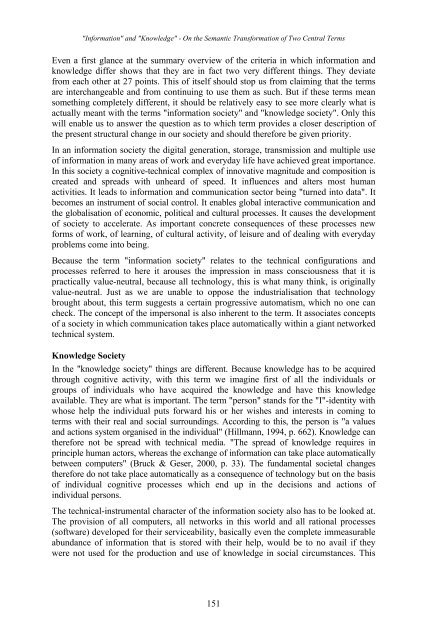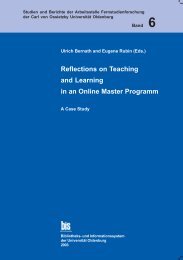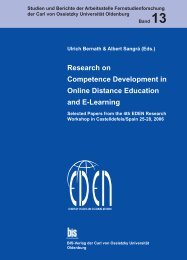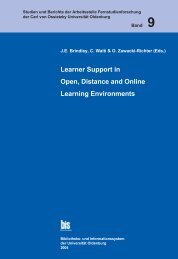Distance Education in Transition - Master of Distance Education ...
Distance Education in Transition - Master of Distance Education ...
Distance Education in Transition - Master of Distance Education ...
You also want an ePaper? Increase the reach of your titles
YUMPU automatically turns print PDFs into web optimized ePapers that Google loves.
"Information" and "Knowledge" - On the Semantic Transformation <strong>of</strong> Two Central Terms<br />
Even a first glance at the summary overview <strong>of</strong> the criteria <strong>in</strong> which <strong>in</strong>formation and<br />
knowledge differ shows that they are <strong>in</strong> fact two very different th<strong>in</strong>gs. They deviate<br />
from each other at 27 po<strong>in</strong>ts. This <strong>of</strong> itself should stop us from claim<strong>in</strong>g that the terms<br />
are <strong>in</strong>terchangeable and from cont<strong>in</strong>u<strong>in</strong>g to use them as such. But if these terms mean<br />
someth<strong>in</strong>g completely different, it should be relatively easy to see more clearly what is<br />
actually meant with the terms "<strong>in</strong>formation society" and "knowledge society". Only this<br />
will enable us to answer the question as to which term provides a closer description <strong>of</strong><br />
the present structural change <strong>in</strong> our society and should therefore be given priority.<br />
In an <strong>in</strong>formation society the digital generation, storage, transmission and multiple use<br />
<strong>of</strong> <strong>in</strong>formation <strong>in</strong> many areas <strong>of</strong> work and everyday life have achieved great importance.<br />
In this society a cognitive-technical complex <strong>of</strong> <strong>in</strong>novative magnitude and composition is<br />
created and spreads with unheard <strong>of</strong> speed. It <strong>in</strong>fluences and alters most human<br />
activities. It leads to <strong>in</strong>formation and communication sector be<strong>in</strong>g "turned <strong>in</strong>to data". It<br />
becomes an <strong>in</strong>strument <strong>of</strong> social control. It enables global <strong>in</strong>teractive communication and<br />
the globalisation <strong>of</strong> economic, political and cultural processes. It causes the development<br />
<strong>of</strong> society to accelerate. As important concrete consequences <strong>of</strong> these processes new<br />
forms <strong>of</strong> work, <strong>of</strong> learn<strong>in</strong>g, <strong>of</strong> cultural activity, <strong>of</strong> leisure and <strong>of</strong> deal<strong>in</strong>g with everyday<br />
problems come <strong>in</strong>to be<strong>in</strong>g.<br />
Because the term "<strong>in</strong>formation society" relates to the technical configurations and<br />
processes referred to here it arouses the impression <strong>in</strong> mass consciousness that it is<br />
practically value-neutral, because all technology, this is what many th<strong>in</strong>k, is orig<strong>in</strong>ally<br />
value-neutral. Just as we are unable to oppose the <strong>in</strong>dustrialisation that technology<br />
brought about, this term suggests a certa<strong>in</strong> progressive automatism, which no one can<br />
check. The concept <strong>of</strong> the impersonal is also <strong>in</strong>herent to the term. It associates concepts<br />
<strong>of</strong> a society <strong>in</strong> which communication takes place automatically with<strong>in</strong> a giant networked<br />
technical system.<br />
Knowledge Society<br />
In the "knowledge society" th<strong>in</strong>gs are different. Because knowledge has to be acquired<br />
through cognitive activity, with this term we imag<strong>in</strong>e first <strong>of</strong> all the <strong>in</strong>dividuals or<br />
groups <strong>of</strong> <strong>in</strong>dividuals who have acquired the knowledge and have this knowledge<br />
available. They are what is important. The term "person" stands for the "I"-identity with<br />
whose help the <strong>in</strong>dividual puts forward his or her wishes and <strong>in</strong>terests <strong>in</strong> com<strong>in</strong>g to<br />
terms with their real and social surround<strong>in</strong>gs. Accord<strong>in</strong>g to this, the person is "a values<br />
and actions system organised <strong>in</strong> the <strong>in</strong>dividual" (Hillmann, 1994, p. 662). Knowledge can<br />
therefore not be spread with technical media. "The spread <strong>of</strong> knowledge requires <strong>in</strong><br />
pr<strong>in</strong>ciple human actors, whereas the exchange <strong>of</strong> <strong>in</strong>formation can take place automatically<br />
between computers" (Bruck & Geser, 2000, p. 33). The fundamental societal changes<br />
therefore do not take place automatically as a consequence <strong>of</strong> technology but on the basis<br />
<strong>of</strong> <strong>in</strong>dividual cognitive processes which end up <strong>in</strong> the decisions and actions <strong>of</strong><br />
<strong>in</strong>dividual persons.<br />
The technical-<strong>in</strong>strumental character <strong>of</strong> the <strong>in</strong>formation society also has to be looked at.<br />
The provision <strong>of</strong> all computers, all networks <strong>in</strong> this world and all rational processes<br />
(s<strong>of</strong>tware) developed for their serviceability, basically even the complete immeasurable<br />
abundance <strong>of</strong> <strong>in</strong>formation that is stored with their help, would be to no avail if they<br />
were not used for the production and use <strong>of</strong> knowledge <strong>in</strong> social circumstances. This<br />
151





